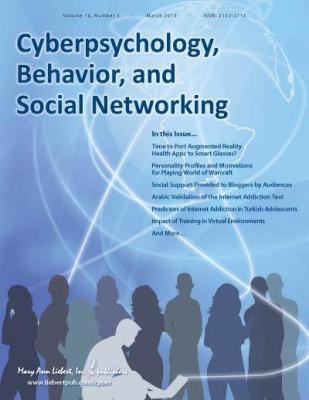Apr 5 2013
Pet therapy can help patients cope with the pain, stress, and emotional effects of a serious illness, but access to a companion animal is not always possible. Robotic animals may offer the same benefits, as explored in a fascinating study presented in Cyberpsychology, Behavior, and Social Networking, a peer-reviewed journal from Mary Ann Liebert, Inc., publishers.
 Cyberpsychology, Behavior, and Social Networking is a peer-reviewed journal published monthly online with Open Access options and in print that explores the psychological and social issues surrounding the Internet and interactive technologies, plus cybertherapy and rehabilitation. Complete tables of content and a sample issue may be viewed on the Cyberpsychology, Behavior, and Social Networking website. Credit: © Mary Ann Liebert, Inc., publishers
Cyberpsychology, Behavior, and Social Networking is a peer-reviewed journal published monthly online with Open Access options and in print that explores the psychological and social issues surrounding the Internet and interactive technologies, plus cybertherapy and rehabilitation. Complete tables of content and a sample issue may be viewed on the Cyberpsychology, Behavior, and Social Networking website. Credit: © Mary Ann Liebert, Inc., publishers
The article is available free online on the Cyberpsychology, Behavior, and Social Networking website.
Sandra Okita, PhD, Columbia University (New York, NY) evaluated the effectiveness of robotic companions to reduce feelings of pain and emotional anxiety among pediatric patients and their parents. In the article "Self-Other's Perspective Taking: The Use of Therapeutic Robot Companions as Social Agents for Reducing Pain and Anxiety in Pediatric Patients," Dr. Okita reports that when a child and parent were together during robot therapy sessions, the patients' pain ratings decreased significantly. There were no differences in the pain ratings when the child interacted with the robot animal without the parent present.
Additionally, when the parent and child were together for the robot therapy sessions, as the parent's pain rating decreased, so did the patient's, which the author attributes to "parental modeling." Children learn how to cope with emotions such as fear and anxiety by observing how an adult responds and behaving in a similar manner.
"It will be useful to explore in future studies whether the benefit of parental modeling exhibited during the interactions is maintained long-term," says Brenda K. Wiederhold, PhD, MBA, BCIA, Editor-in-Chief of Cyberpsychology, Behavior, and Social Networking, from the Interactive Media Institute, San Diego, CA. "It will also be important to understand how we may lower pain and anxiety in children without the presence of their parents, which is of course not always feasible in a hospital setting."